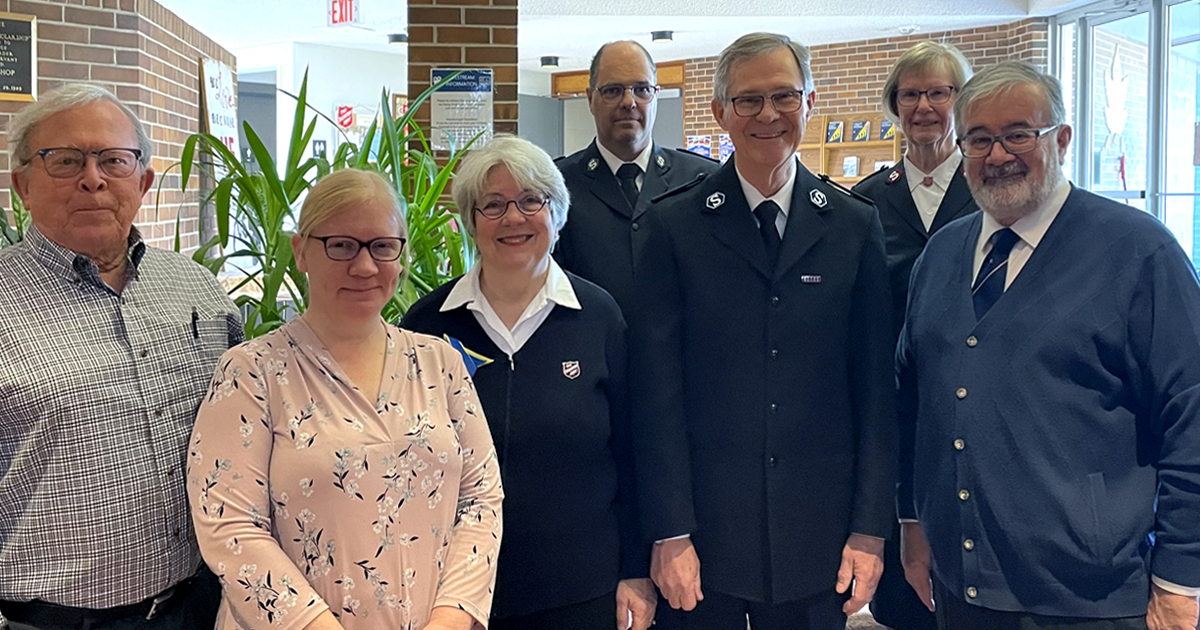The Salvation Army’s mission statement includes three key action words: to share the love of God, meet human needs and transform our world. Every Salvationist does this in their own way—for Paul Deacon, a member of Winnipeg’s Heritage Park Temple, it began with a presentation on accessibility and a sign-up list. He spearheaded a new accessibility committee at the corps that helps meet the diverse and unique needs within the congregation and the wider community, inviting all people to share the love of Jesus.
“It’s part of our mission to reach out to the world and the people in our community, and to let them know they’re welcome,” says Deacon. “The accessibility committee is about instilling a sense of mission into the congregation through the eyes of others who experience different needs.”
Taking Action
In his day job, Deacon is the manager of maintenance, safety and accessibility services for the St. James-Assiniboia School Division in Winnipeg, and in doing this work he has become familiar with accessibility policies and procedures. “I see many of the barriers that are faced by people with disabilities,” says Deacon.
One Sunday morning, after talking to his corps officers, Captains Ian and Kam Robinson, Deacon gave a presentation on accessibility followed by a sermon. His message was rooted in Scripture, discussing The Salvation Army’s responsibility to understand the needs of others and create a church that is welcoming and accessible.
“The goal of this committee is to break down barriers that are presently preventing people from worshipping with us so that we can realize our vision as a ministry motivated by God,” Deacon explained from the pulpit in January. Then, he put up a list and invited congregants to sign up for a committee on accessibility.
The committee, now with seven active members, meets on an ad hoc basis to draw up a list of accessibility needs at the corps, put those needs in order of priority and funding, and make recommendations to the corps leaders. They look at immediate changes, near-future changes and long-term changes that can be made to improve physical and other barriers.
“These are not barriers to a relationship with God; they’re barriers to our building and our community,” said Deacon in his sermon. “Action needs to come first. Our accessibility committee is a God-focused and God-motivated ministry.”
In closing, Deacon reminded the people at Heritage Park Temple of their mission and the obligation to allow all people an opportunity to worship and grow with The Salvation Army.
Removing Barriers
The accessibility committee focuses on making change in five broad categories: barriers to mobility and dexterity; vision barriers; communication barriers; mental-health barriers; and attitudinal barriers.
At Heritage Park Temple, one of the first items on the committee’s to-do list is to provide a new lift from the foyer into the sanctuary, as the ramp in the sanctuary is steep. Other considerations for mobility and dexterity in many corps may be implementing grab bars for stability; replacing handrails for more comfortable and reachable options; or creating suitable pathways into and through the building that are clear of physical obstructions, such as non-automatic doors, steps, poles or narrow doorways.
“Currently, if kids come to Sunday school here, they have to climb stairs,” says Deacon. “We can’t just wait until a child comes in with accessibility needs. We have to make the change and do our ministry through the lens of other people.”
Corps can also make smaller changes to improve barriers to vision for their congregation, such as providing large-print Bibles and bulletins or adding high-visibility strips to staircases and platform steps. For some people, hearing can be a challenge in large sanctuaries. Heritage Park Temple has applied for funding for hearing loops, a system for those with hearing aids to tune directly into a microphone system worn by the speaker.
“The people at Heritage Park Temple are very good people, and if they notice these barriers exist, they are going to want to help take them down,” says Deacon.
Though physical changes can create a more accessible environment at church, there are additional non-physical barriers—mental-health and attitudinal barriers—that the committee addresses to help make church a more welcoming place to people with exceptional needs. It is important to deliver accessibility education and mental-health awareness training so that people know that these barriers exist and understand their role in improving them.
We Welcome You
Among the congregants at Heritage Park Temple is Major Cathie Harris, who joined the committee after hearing Deacon’s presentation at the corps. “Since going to just two meetings, my awareness has heightened,” says Major Harris. “If we’re going to be a welcoming community, we must be prepared. We need to take the initiative to make our building and our congregation as open as possible.”
Deacon notes that many Salvation Army churches have a large population of generational or longtime Salvationists rather than a wave of new congregants from the community. These dedicated Salvationists will attend services faithfully, no matter what. But for others who may be deciding between churches, or if they should attend church on Sundays at all, accessibility is a vital factor in decision-making for individuals and families with disabilities. They may choose to attend or not attend a Salvation Army church based on how accessible it is and how welcome, accepted and seen they feel when they enter through the doors.
“It’s one thing to send out an invitation to all people and tell them they’re welcome, but we need to be proactive and eliminate any barriers before we invite them,” says Deacon. “We need to make it as accessible as we can, taking care of our buildings, our attitudes and our technology, so that we can say, ‘We welcome you and here’s how.’ ”
This article is the first of a four-part series on accessibility in the church. Articles will be published monthly, alternating in print and online at Salvationist.ca.
Read the rest of the series here:
Accessing Hope: In Trail, B.C., The Salvation Army provides dignity through accessible employment and service.
A Theology of Welcome: St. John's Citadel, N.L., reaches out to the community with accessible programming.
Unity in Access: A new sensory room at St. Thomas Citadel, Ont., is creating a more understanding church.










What a great example of a corps being pro-active in being accessible and making all welcome to be part of your faith community. May God bless your efforts.